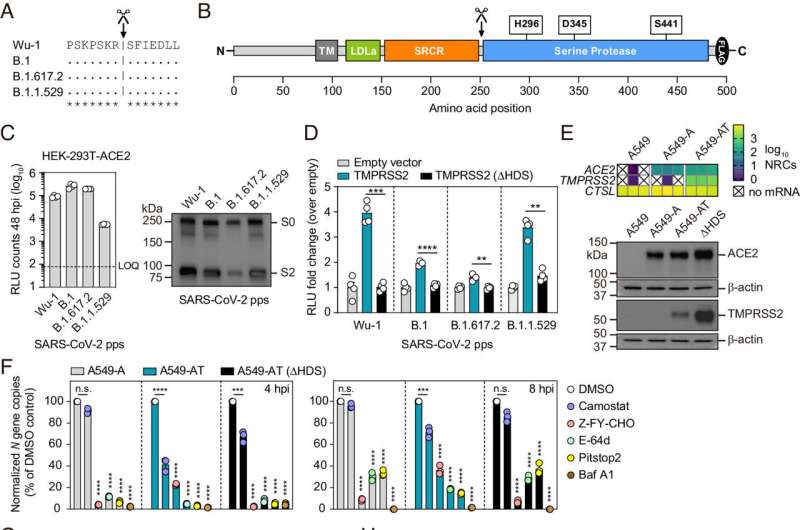This article has been reviewed according to Science X's editorial process and policies. Editors have highlighted the following attributes while ensuring the content's credibility:
fact-checked
peer-reviewed publication
trusted source
proofread
Study: The route into the cell influences the outcome of SARS-CoV-2 infection

How exactly do SARS-CoV-2 particles enter host cells? An international team led by Dr. Richard Brown from Dr. Daniel Todt's Computational Virology group at the Department of Molecular and Medical Virology at Ruhr University Bochum, Germany, together with researchers from the Paul-Ehrlich-Institut, has investigated this question.
The researchers were able to show how the protein TMPRSS2 acts as a helper to bring the virus into the cell via the receptor ACE2. This TMPRSS2-mediated uptake significantly alters the immune response of the host cells and drives the evolution of the virus. The team also showed that this applies to early variants of the virus as well as the more recent omicron variant, and functions not only in humans, but likely also in wild, domestic and farm animals.
The researchers report their findings in the journal PNAS on May 30, 2024.
A role for endosomes?
"It is undisputed that the presence of TMPRSS2 makes the entry of virus particles into host cells more efficient," explains Dr. Brown, "but there were still many unanswered questions: How exactly does cell entry improve? What happens in the cell afterwards? Does this effect only work in humans?"
To get to the bottom of these questions, the researchers used an electron microscope to directly compare viral entry into cells expressing either the ACE2 receptor alone, with cells that express both ACE2 and TMPRSS2 together. As expected, they were able to see that the presence of TMPRSS2 improved virus uptake.
"Contrary to previous assumptions, however, it was shown that TMPRSS2-mediated cell entry is associated with increased virus uptake into specific cellular vesicles: endosomes," explains Dr. Brown. "Until now, this entry pathway was thought to bypass endosomes. These observations were unexpected and further detailed studies are needed."
Furthermore, the researchers observed that the more recent omicron variant also benefits from the presence of the TMPRSS2 protein in the same way as older variants. "Although the omicron variant does not require TMPRSS2 to enter, virus uptake into host cells is also significantly increased when it is present," says Dr. Brown.
What happens after entry
The researchers also wanted to know what happens after the virus particles enter the host cells. They were able to show that for all tested variants, a more efficient TMPRSS2-mediated entry into host cells led to increased viral genome replication, followed by increased virus production. Infected cells react to this with a stronger immune response, which leads to faster death. The increased immune response has an influence on the evolution of the virus. If the host cells react more strongly, viruses with certain mutations prove to be advantageous and prevail.
The entry enhancing effects of TMPRSS2 are not limited to human hosts, but can also be observed in other mammals, including so-called reservoir species, which are natural hosts of coronaviruses in the wild.
"Taken together, our data confirm that TMPRSS2 broadly promotes initial infection at the virus-host interface and influences the outcome of infection, with different mammalian species having the potential to influence the ongoing evolution of SARS-CoV-2," summarizes Dr. Brown.
More information: Bingqian Qu et al, TMPRSS2-Mediated SARS-CoV-2 Uptake Boosts Innate Immune Activation, Enhances Cytopathology and Drives Convergent Virus Evolution, Proceedings of the National Academy of Sciences (2024). DOI: 10.1073/pnas.2407437121. www.pnas.org/doi/10.1073/pnas.2407437121


















